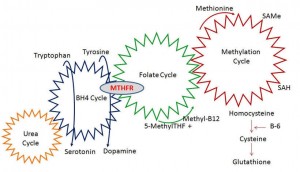‘MTHFR and fertility’
In 2003 a genetic study called the Human Genome Project was completed. Via that study, they discovered a common polymorphism in an important gene for health and well-being.
When working correctly, the MTHFR gene begins a multi-step process (aka methylation) which simply means the MTHFR enzyme works with folate, to break it down and convert the amino acid called homocysteine into methionine. This conversion aids the liver in processing fats, and helps the body produce proteins and utilize antioxidants. When the MTHFR polymorphism is present, it means the enzyme’s function is less than optimal (between 40-70% of its capacity).
The important connection between folate and successful pregnancy are well documented, and many women with a history of infertility and miscarriages have found an important missing ‘link’ in taking the MTHFR blood test.
Methionine can help alleviate depression and inflammation, and convert estrogen into its active form. Therefore the MTHFR enzyme supports not only fertility, but weight, immunity and production of serotonin, dopamine and melatonin – the hormones that regulate moods and sleep.
Patients may show high levels of folate or B12 in blood tests – this means that the body is not converting them properly, rather than there being an ‘optimal amount’ of these nutrients. No two people are the same, and studies are still being carried out to find links between the MTHFR polymorphism and potential issues.
How can MTHFR be treated?
It is important to take the active form of MTHF in order to make up for what the body is lacking. This will help alleviate potential symptoms being experienced, and should be taken in the long term. Along with this, other nutrients that work together with the enzyme such as activated B vitamins, will support fertility and well being. This applies to anyone wishing to conceive naturally or via assisted reproductive therapies.
Diet is also hugely important, and the most up to date research believes that daily intake of greens is absolutely essential, as are berries, which contain a rich source of bio available folate.
Good digestive health is essential, so maintaining a ‘clean’ diet, reducing inflammatory foods, and ensuring optimal gut flora will support long term health management.
Naturopathic consultation will assess your symptoms and current health state, refer you for a simple blood test if necessary, and tailor an individual plan to best support your needs.

